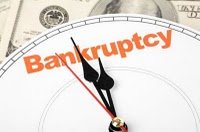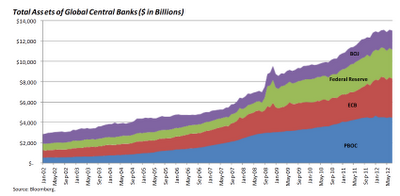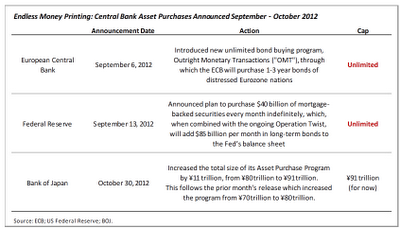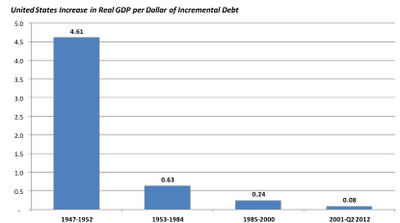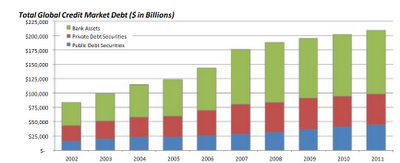“Entirely Self-Made” Debt Crisis; I Love My Family But …
The average 7th grader likely understands that he cannot spend more money than he has for years on end. The average economist does not.
By Mike “Mish” Shedlock at Mish’s Global Economic Trend Analysis
As debt that cannot possibly ever be paid back spirals out of control, it is amusing (as well as saddening) to watch widely-read economists propose still more of the same policies that have failed time and time again.
Today’s silliness comes from Ambrose Evans-Pritchard at the Telegraph.
Pritchard’s headline title Merkel’s day of reckoning as taxpayer haircut on Greece looms makes perfect sense as does his opening gambit.
We are at last nearing the awful moment when the curtain is ripped away. Greece’s economy has contracted 7pc over the last year. Public debt will spiral to 190pc of GDP in 2013. Leaving aside the Gothic horror of youth unemployment at 58pc, Greece’s debt trajectory is simply out of control.
I have no quibbles with that paragraph, or for that matter, many paragraphs that follow. Unfortunately, Pritchard concludes with Monetartist claptrap, as to how things ought to be.
Fiscal policy is too tight. Monetary policy is too tight. Regulatory policy is also too tight since it is forcing banks to raise capital buffers even as the slump deepens.
Professor Paul de Grauwe from the London School of Economics said the deepening crisis is “entirely self-made” and “very dangerous” as passions fly. Angela Merkel had to slip into Portugal last week almost secretly to outwit demonstrators and avoid a “national sovereignty” march. One of her diplomats was assaulted by a mob in Greece.
It would have been so much easier for Euroland, for the Project, for North-South comity, if the ECB had let rip a long time ago with quantitative easing to cushion the blow from fiscal tightening, but that is to suppose a different Europe existed.
“Entirely Self-Made” Crisis
The crisis most certainly is “Entirely Self-Made”, just not in the manner de 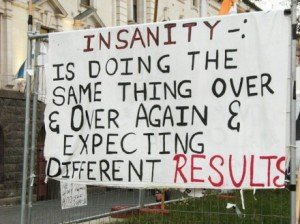 Grauwe and Pritchard state.
Grauwe and Pritchard state.
The sad thing is Pritchard knows full well the euro was doomed from the start. He was one of the original eurosceptics, predicting accurately the euro could not survive.
Now, in spite of all the numerous structural flaws of the euro, somehow we are to believe things would be “much easier for Euroland if the ECB had let rip a long time ago with quantitative easing“.
What a crock. If QE worked and fiscal stimulus worked, Japan would not have debt-to-GDP ratio of 230%. Japan’s national debt bow exceeds a quadrillion yen!
A quadrillion is a number with 15 zeros. 1,000,000,000,000,000. Can that ever be paid back? How?
Ivory Tower Economists in Academic Wonderland
In the US, Fed chairman Ben Bernanke is now in round three of QE. This round is undefined. Has QE created any jobs? If so where?
In addition to QE the US has been running budget deficits exceeding $1 trillion for four straight years. What the heck is that other than Keynesian stimulus?
It has failed. But economists like Paul Krugman want more of it (please see Mish on Capital Account: “Time for Krugman to Leave Ivory Tower for Real World”).
Krugman will claim deficit spending prevented disaster. It did no such thing. All it did is pile up the debt that cannot possibly be paid back.
The average 7th grader likely understands that he cannot spend more money than he has for years on end. The average economist does not.
That is one of the reasons we are in this mess. And as I have said repeatedly, hyperinflationists fail to understand this is not just a US problem.
Central Bankers’ Potemkin Village
If there was one report this entire year that you should read in entirety, Central Bankers’ Potemkin Village by Kyle Bass at Hayman Capital is the one.
The article is lengthy (at 31 pages) and is protected from text copy, but requires no password to read. It will be well worth your time to read the entire thing.
The following charts are all from the article.
Total Assets of Global Central Banks
Somehow Pritchard believes things would be different if only the ECB engaged in more QE. Really? Seems to me the increase in ECB assets has hardly stabilized a thing.
To the extent that it did, it certainly fixed no structural problems.
Kyle Bass comments “QE just doesn’t stimulate private credit demand and consumption in an economy where total credit market debt to GDP already exceeds 300%. The UK is the poster child for abject failure of QE. The Bank of England has purchased over 27% of gross debt (vs. 12% in the US). UK bond yields are now negative in real terms by at least -1%. Unlimited QE and the zero lower bound (ZLB) are likely to bankrupt pension funds whose expected returns happen to be a good 600 basis points or more higher than the 10-year risk-free rate.”
Indeed! I wrote about this long ago in Hello Ben Bernanke, Meet “Stephanie”.
Please give that a read in case you missed it.
Monetary Printing ECB, Fed, Bank of Japan
Did that work? If you think it did, then consider the next chart.
US GDP vs. Incremental Debt
For every dollar of incremental debt, the US gets 8 cents in additional GDP, down from $4.61 in 1952. Is this a good bargain?
Krugman seems to think so.
Total Global Credit Market Debt in $Billions
I Love My Family But …
Many economists complain that Germany is to blame for refusing to go along with eurobonds (joint euro based debt).
Bass asks “How many of your extended family would you assume all past and future debts with jointly and severally? … As much as I love my extended family, I would never agree to be jointly and severally liable with any of them.”
Would you?
Yet somehow, we are to believe the solution for the eurozone mess is for Germans to be jointly liable for the debt of Greeks, Spanish, Portuguese, and Irish.
Really? Without starting a war?
Bass writes “Sadly, looking back through economic history, all too often war is the manifestation of simple economic entropy played to its logical conclusion. We believe that war is an inevitable consequence of the current global economic situation.”
If that seems far-fetched, then think of the hotbed in the Mideast with Iran. Think of the rise of the neo-Nazis in Greece. Think of the conflict between Japan and China over uninhabited islands in the East China Sea.
Those unaware of the seriousness of the dispute between China and Japan should read Taiwan Claims Islands Too; What’s the Dispute Really About?
I thank Kyle Bass for this report and reiterate if there was one report this entire year that you should read in entirety, Central Bankers’ Potemkin Village by Kyle Bass at Hayman Capital is the one.
http://globaleconomicanalysis.blogspot.com
Help Make A Difference By Sharing These Articles On Facebook, Twitter And Elsewhere:
